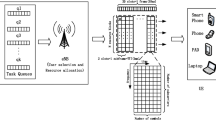Abstract
In this study, resource allocation problems in uplink transmissions of long term evolution (LTE) networks involving single-carrier frequency division multiple access were addressed and a two-stage process for obtaining solutions was proposed. In the first stage, a buffer-aware (BA) scheme that allocates resources according to users’ buffer statuses is used to simultaneously reduce wastage of system resources and improve the throughput of each user. In the second stage, a BA-scheme-based enhanced algorithm is used for considering the delay-sensitive (DS) characteristics of packets. Simulations were conducted to compare the performance of the proposed BA and DS resource allocation algorithm with that of other approaches. The results show that the proposed algorithm can effectively improve the aggregate throughput and reduce both the packet loss rate and average packet delay in comparison with other schemes, thus enhancing the overall uplink efficiency of LTE networks.










Similar content being viewed by others
References
3GPP. http://www.3gpp.org.
Ghosh, A., Ratasuk, R., Mondal, B., Mangalvedhe, N., & Thomas, T. (2010). LTE-advanced: Next-generation wireless broadband technology. IEEE Wireless Communications, 17(3), 10–22.
Yaacoub, E., & Dawy, Z. (2009). A game theoretical formulation for proportional fairness in LTE uplink scheduling. In Proceedings of IEEE WCNC 2009.
Delgado, O., & Jaumard, B. (2010). Scheduling and resource allocation in LTE uplink with a delay requirement. In Proceedings of IEEE eighth annual communication networks and services research conference (CNSR) (pp. 268–275).
Lee, S.-B., Pefkianakis, I., Meyerson, A., Xu, S., & Lu, S. (2009). Proportional fair frequency-domain packet scheduling for 3GPP LTE uplink. In Proceedings of IEEE INFOCOM 2009 (pp. 2611–2615).
Wong, I., Oteri, O., & Mccoy, W. (2009). Optimal resource allocation in uplink SC-FDMA systems. IEEE Transactions on Wireless Communications, 8(5), 2161–2165.
Nwamadi, O., Zhu, X., & Nandi, A. K. (2011). Dynamic physical resource block allocation algorithms for uplink long term evolution. IET Communications, 5(7), 1020–1027.
Al-Rawi, M., Jantti, R., Torsner, J., & Sagfors, M. (2008). On the performance of heuristic opportunistic scheduling in the uplink of 3G LTE networks. In Proceedings of IEEE PIMRC 2008.
Wang, C., & Li, X. (2013). A buffer-aware resource allocation scheme for 4G LTE systems. In Proceedings of IEEE 17th international symposium on consumer electronics (ISCE) 2013 (pp. 157–158).
Saad, W., Dawy, Z., & Sharafeddine, S. (2012). A utility-based algorithm for joint uplink/downlink scheduling in wireless cellular networks. Journal of Network and Computer Applications, 35(1), 348–356.
Dechene, D. J., & Shami, A. (2011). Energy efficient resource allocation in SC-FDMA uplink with synchronous HARQ constraints. In Proceedings of IEEE ICC 2011.
Aijaz, A., Chu, X., & Aghvami, A. H. (2014). Energy efficient design of SC-FDMA based uplink under QoS constraints. IEEE Wireless Communications Letters, 3(2), 149–152.
Bodas, S., & Sadiq, B. (2013). Polynomial-complexity, low-delay scheduling for SCFDMA-based wireless uplink networks. In Proceedings of IEEE INFOCOM 2013 (pp. 575–579).
Tassiulas, L., & Ephremides, A. (1992). Stability properties of constrained queueing systems and scheduling policies for maximum throughput in multihop radio networks. IEEE Transactions on Automatic Control, 37(12), 1936–1948.
Neely, M. J. (2010). Stochastic network optimization with application to communication and queueing systems. San Rafael, CA: Morgan and Claypool.
Le, L. B., Modiano, E., & Shroff, N. B. (2012). Optimal control of wireless networks with finite buffers. IEEE/ACM Transactions on Networking, 20(4), 1316–1329.
Proakis, J. G., & Salehi, M. (2005). Essentials of communication systems engineering. London: Pearson.
3GPP. (2011). TS 36.213: 3rd generation partnership project; Technical specification group radio access network; Evolved universal terrestrial radio access (E-UTRA); Physical layer procedures, V10.4.0.
3GPP. (2011). TS 22.105, Universal mobile telecommunications system (UMTS); LTE; Services and service capabilities (Release 10), V10.0.0.
Sesia, S., Toufik, I., & Baker, M. (2009). LTE—The UMTS long term evolution, from theory to practice. London: Wiley.
Vaghefi, R. M., & Buehrer, R. M. (2014). Improving positioning in LTE through collaboration. In Proceedings of IEEE WPNC 2014.
Sadiq, B., Madan, R., & Sampath, A. (2009). Downlink scheduling for multiclass traffic in LTE. EURASIP Journal on Wireless Communications and Networking, 2009, 1–18.
Estepa, A. J., Vozmediano, J. M., López, J., & Estepa, R. M. (2011). Impact of VoIP codes on the energy consumption of portable devices. In Proceedings of the 6th ACM workshop on performance monitoring and measurement of heterogeneous wireless and wired networks (pp. 123–130).
Ali, S., & Zeeshan, M. (2011). A delay-scheduler coupled game theoretic resource allocation scheme for LTE networks. In Proceedings of IEEE 9th international conference on frontiers of information technology (FIT) (pp. 14–19).
Acknowledgments
This work was supported in part by Taiwan National Science Council under Grants 102-2221-E-003-002 and MOST 103-2221-E-003-007.
Author information
Authors and Affiliations
Corresponding author
Rights and permissions
About this article
Cite this article
Wang, C., Huang, JJ. & Su, CY. Buffer-Aware and Delay-Sensitive Resource Allocation in the Uplink of 3GPP LTE Networks. Wireless Pers Commun 84, 1877–1890 (2015). https://doi.org/10.1007/s11277-015-2490-3
Published:
Issue Date:
DOI: https://doi.org/10.1007/s11277-015-2490-3




